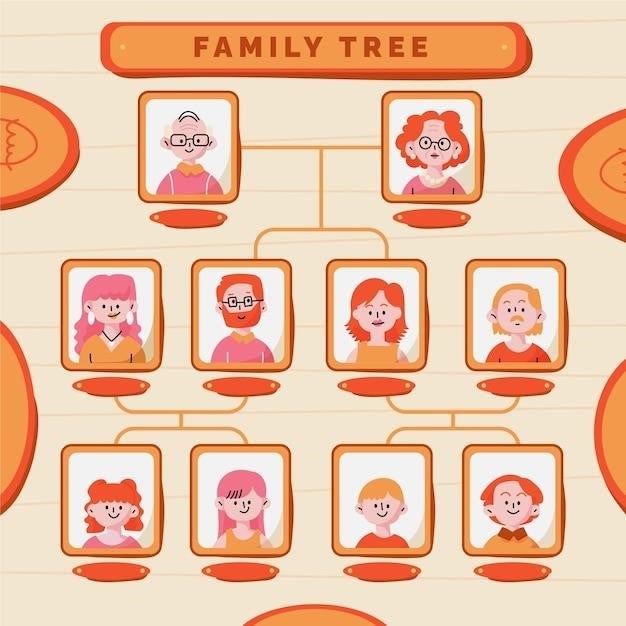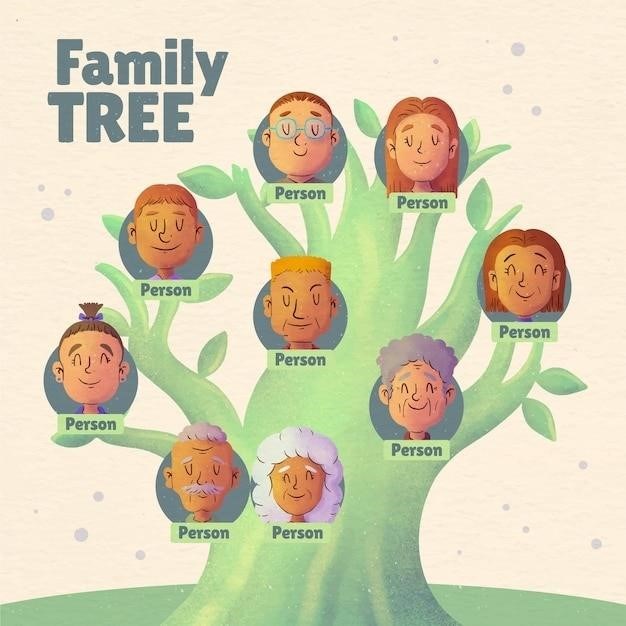Internal Family Systems (IFS) Worksheets⁚ A Comprehensive Guide
This guide explores Internal Family Systems (IFS) worksheets, offering a range of tools for therapists and individuals. Discover diverse resources, from free online PDFs to specialized exercises, enhancing self-awareness and healing.
Understanding IFS Therapy
Internal Family Systems (IFS) therapy views the psyche as comprised of various “parts,” each with unique roles and functions. These parts aren’t inherently good or bad; they’re driven by past experiences and survival strategies. IFS aims to foster self-leadership by helping individuals identify and understand these parts, particularly the “Self,” the core of wisdom, compassion, and calm. The therapeutic process involves befriending these parts, understanding their intentions, and ultimately integrating them for a more cohesive and peaceful inner experience. This approach emphasizes self-compassion and acceptance, fostering healing and personal growth. IFS is particularly helpful for trauma, anxiety, and depression.
Key Concepts in IFS⁚ Self, Parts, and their Roles
IFS centers on the concept of the “Self,” the core of wisdom and compassion within each individual. Surrounding the Self are various “parts,” each with specific roles and motivations. These parts develop as coping mechanisms for past experiences, often manifesting as protective strategies or emotional responses. “Managers” strive for control, “Firefighters” quell intense emotions, and “Exiles” hold painful memories and emotions. Understanding these parts and their roles is crucial in IFS therapy. Worksheets can aid in identifying and characterizing these parts, facilitating communication between them and the Self, leading to greater self-awareness and integration.
Types of Parts in IFS⁚ Managers, Firefighters, and Exiles
Within the Internal Family Systems model, parts are categorized to understand their functions. “Managers” are protective parts that control behaviors to avoid perceived threats, often creating rigid rules and suppressing emotions. “Firefighters” are reactive parts that jump in during crisis, employing extreme measures to manage overwhelming feelings, sometimes leading to self-destructive behaviors. “Exiles” carry the burden of painful memories and intense emotions, often hidden from awareness. IFS worksheets help clients identify these parts, understand their intentions, and develop compassionate responses, fostering self-acceptance and integration.
The Importance of the Self in IFS Therapy
In IFS, the “Self” represents the core of our being—a calm, compassionate, and wise center. Unlike the often-reactive “parts,” the Self is inherently resourceful and capable of guiding us towards healing and well-being. Accessing and strengthening the Self is central to IFS therapy. Worksheets can assist in this process by facilitating self-compassion exercises and encouraging reflection on the Self’s inherent qualities. By connecting with the Self, individuals can gain perspective, regulate emotions, and foster healthier relationships with their internal parts. The Self acts as a unifying force, promoting integration and inner peace;
Utilizing IFS Worksheets in Therapy
IFS worksheets serve as valuable tools within therapy sessions. They provide a structured approach to exploring internal experiences, facilitating communication between the therapist and client. Worksheets can be used to identify and label different internal “parts,” map their roles and functions, and track emotional responses. They can also be employed to practice self-compassion and build self-leadership skills. The therapist guides the client in using the worksheets, fostering a collaborative and insightful process. Worksheets are not standalone solutions but rather supportive aids in the therapeutic journey, providing tangible methods for exploring complex internal dynamics. They help clients organize their thoughts and feelings, leading to deeper self-understanding.

Benefits of Using IFS Worksheets
IFS worksheets boost self-awareness, improve communication with internal parts, and facilitate healing and integration. They promote self-compassion and acceptance, empowering clients in their therapeutic journey.
Enhanced Self-Awareness and Understanding
Internal Family Systems (IFS) worksheets significantly enhance self-awareness by prompting introspection and self-reflection. Through guided exercises, clients identify and label their internal “parts,” understanding their roles and motivations. This process illuminates the interplay of emotions, thoughts, and behaviors, leading to a deeper comprehension of internal conflicts. Worksheets facilitate the exploration of personal narratives and patterns, fostering a more nuanced understanding of the self. The act of journaling and documenting these insights reinforces learning and promotes self-acceptance. By externalizing internal experiences, worksheets provide a tangible framework for understanding the complex inner world, paving the way for personal growth and healing. This increased self-understanding is crucial for effective IFS therapy and lasting positive change.
Improved Communication with Internal Parts
IFS worksheets act as valuable tools to foster improved communication between the Self and various internal parts. Structured exercises guide clients in identifying and naming their parts (e.g., exiles, managers, firefighters), assigning each a voice and perspective. This process facilitates dialogue and understanding between these often-conflicting internal aspects. By externalizing these inner voices through writing, clients gain distance and objectivity, reducing the intensity of internal struggles. Worksheets provide a safe space to explore the needs and concerns of each part, creating a pathway for empathy and compassion. This improved communication leads to a more integrated and harmonious inner experience, fostering emotional regulation and reducing internal conflict. The ability to understand and communicate with one’s internal parts is a cornerstone of successful IFS therapy.
Facilitating Healing and Integration
Internal Family Systems (IFS) worksheets play a crucial role in facilitating healing and integration by providing a structured approach to processing difficult emotions and experiences. Through guided exercises, clients can safely explore and understand the origins and functions of their internal parts. Worksheets help to unburden these parts, releasing trapped emotions and limiting beliefs. By fostering self-compassion and acceptance, these tools help clients develop a sense of wholeness and integration. The process of identifying, understanding, and compassionately interacting with different parts promotes healing from past trauma and fosters a stronger sense of self. Worksheets offer a tangible way to track progress, reinforce learnings, and solidify the therapeutic gains achieved during sessions, ultimately leading to a more integrated and balanced inner world.
Promoting Self-Compassion and Acceptance
IFS worksheets are invaluable in fostering self-compassion and acceptance. By providing a safe space for self-reflection, these tools encourage clients to approach their internal parts with kindness and understanding, rather than judgment. Exercises often involve writing compassionate letters to these parts, acknowledging their pain and struggles. This process helps to shift the relationship with internal critics and painful emotions from one of conflict to one of empathy and acceptance. The act of putting feelings and experiences down on paper can be incredibly cathartic, leading to a greater sense of self-acceptance and reduced self-criticism. Worksheets can also guide clients in identifying and celebrating their strengths, promoting a more balanced and positive self-image. This cultivates self-compassion, a cornerstone of healing and personal growth within the IFS framework.

Finding and Utilizing IFS Worksheets
Numerous online resources offer free and paid IFS worksheets. Carefully select those aligning with client needs, integrating them into therapy sessions or self-help practices.
Accessing Free and Paid Resources Online
The internet provides a wealth of IFS worksheet resources. Many websites offer free downloadable PDFs, providing accessible tools for both therapists and individuals engaging in self-guided exploration. These free resources often include basic exercises focusing on identifying and understanding internal parts. Conversely, paid resources frequently offer more comprehensive and structured worksheets, sometimes with additional features like fillable forms or therapist guides. Subscription services or individual purchases may provide access to these premium materials. Remember to carefully review the content and source credibility before utilizing any worksheet, ensuring alignment with your needs and ethical considerations.
Choosing Worksheets Based on Client Needs
Selecting appropriate IFS worksheets requires careful consideration of individual client needs and goals. A client struggling with overwhelming emotions might benefit from a worksheet focusing on identifying and soothing “firefighter” parts, while someone grappling with self-criticism could find an exercise promoting self-compassion more helpful. The worksheet’s complexity should match the client’s understanding of IFS concepts. Begin with simpler exercises for those new to the model and gradually introduce more advanced techniques as they progress. Consider incorporating client feedback to ensure the chosen worksheets are engaging and supportive of their therapeutic journey. Tailoring the approach ensures optimal effectiveness and client engagement.
Incorporating Worksheets into Therapy Sessions
Integrating IFS worksheets effectively requires a thoughtful approach. Begin by introducing the worksheet’s purpose and structure, ensuring the client understands its relevance to their therapeutic goals. Allow ample time for completion during sessions, or assign as homework with a follow-up discussion. Facilitate a safe and non-judgmental space for exploration of the worksheet’s prompts. Guide clients through the process, offering support and clarification as needed, but encourage self-discovery. Use the completed worksheet as a springboard for deeper exploration of identified parts and their roles within the client’s internal system. Remember to adapt the pacing and approach to suit individual client needs and preferences.
Utilizing IFS Worksheets for Self-Help
Many readily available IFS worksheets offer valuable self-help tools. These resources can enhance self-awareness and understanding of internal parts. Start by selecting a worksheet relevant to your current challenges, such as managing difficult emotions or improving self-compassion. Create a quiet, comfortable space for self-reflection. Approach the exercise with curiosity and self-acceptance, acknowledging the presence and function of different internal parts. Take your time to complete the worksheet, journaling your thoughts and feelings honestly. Regularly review your completed worksheets to observe patterns and progress in understanding your internal landscape. Remember, self-compassion is crucial throughout this self-guided process.
Examples of IFS Worksheets and Exercises
Explore practical IFS tools⁚ parts mapping, conflict resolution worksheets, and unburdening exercises. These aid in identifying, understanding, and integrating internal parts for improved well-being.
Parts Mapping Exercise
The Parts Mapping Exercise is a cornerstone of IFS therapy, visually representing internal parts. Clients often find it helpful to create a diagram or list, noting each part’s name, characteristics (e.g., protective, critical), and associated emotions. This exercise fosters self-discovery and understanding of internal dynamics. Identifying parts’ roles (Manager, Firefighter, Exile) helps clients see how these parts interact and impact their behavior. The process encourages self-compassion and acceptance, paving the way for healing and integration. Worksheets facilitate this process by providing structured guidance and space for reflection, promoting a deeper understanding of one’s internal landscape and fostering a more harmonious inner world. This structured approach allows for better management of internal conflicts and promotes emotional regulation.
Resolving Conflicts Between Parts Worksheet
This worksheet addresses common internal conflicts within the IFS model. It guides clients through a process of identifying conflicting parts, understanding their perspectives, and fostering communication between them. The worksheet provides a structured format for exploring the needs and intentions underlying each part’s behavior, promoting empathy and understanding. Through guided prompts, clients learn to negotiate and find common ground between opposing internal forces. This exercise aims to reduce internal conflict and promote a sense of inner harmony. The process encourages self-compassion and acceptance, leading to greater integration and emotional regulation. Many readily available worksheets offer adaptable templates for this valuable therapeutic exercise.
Unburdening Exercises
Unburdening exercises in IFS therapy utilize worksheets to help clients release emotional burdens held by their “parts.” These exercises often involve writing, visualization, or dialogue techniques. Clients may write letters to their parts, expressing understanding and compassion. Visualizations can help clients see their parts releasing emotional weight. Guided dialogues allow clients to communicate directly with their parts, fostering self-compassion and acceptance. Worksheets can structure this process, providing prompts for deeper exploration of emotions and beliefs. The goal is to alleviate the intensity of difficult emotions and facilitate a sense of inner peace. Many therapists adapt these exercises, creating tailored worksheets to meet individual client needs.
